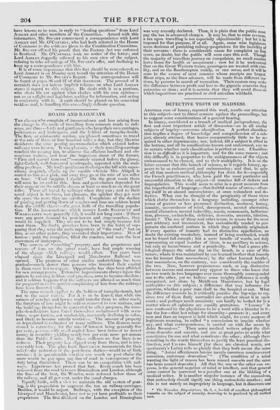ROADS AND RAILWAYS.
Tun classes who complain of inconvenience and loss arising from the change in the mode of travelling from common roads to rail- ways, arc three—lords and gentlemen who keep their own carriages, postmasters and innkeepers, and the holders of turnpike-bonds. The first, or aristocratic section, are pleased sometimes to travel at the rate of three or four hundred miles a day, but they likewise desiderata the same posting accommodation which existed before railways were known. It was pleasant, as their travelling-carriage reached the country inn, to observe the officious landlord and ob- sequious waiters, and hear the imperious shout of the former, " First and second turn out l"—searcely uttered before the glossy, light-limbed, well-harnessed quadrupeds, appeared with the wad- dling posthoys. My lord's gentleman discharges the bill with super- cilious despatch, climbs up the rumble wherein Mrs. Abigail is seated as-fine as a pink, and away they go at the rate of ten miles an hour. " Cosi viaggino i riechi!" On the great roads there will soon be an end to this. Inns and post-chaises depended for their support on the middle classes at least as much as on the great folks. These all travel by railways when they can ; and as their usual object is business, not pleasure, the quicker they get over the space the more they are satisfied. Complaints of the decline of posting and putting down of coaches and inns are seldom heard from the middle classes—the great bulk of the travelling popula- tion. If the inconvenience which annoys Lords SA LTSBU RY and WILIIINCLIFFE were generally felt, it would not long exist : if there were any great demand for post-horses and stage-coaches, they would be supplied. They are not to be had simply because few want them. No doubt, grandees have been in the habit of sup- posing that they were the main supporters of "the road ;" but on this, as on other points, they overrated their importance. Men of' business paid the turnpikes, filled the coaches, and were the best customers of' innkeepers.
The owners of' "snacking" property, and the proprietors and tenants of inns on the great roads, have had ample warning of the change which railweys would effect. Ten years have elapsed since the Liverpool and Manchester Railroad was opened. The progress of other similar undertakings has been gradual—much slower than persons who invested their capital in them were led to expect. Opportunity has thus been afihrded for new arrangements. Extensive improvements always injure the gainers by existing fashions and practices, soon to become obsolete ; and it seldom happens that the sufferers are allowed so much time for preparation es t'e• parties complaining of loss from the railways have been fiwoured with.
Thu same renter!: epplics to the holders of turnpike-bonds, but not to the saute eeteet. Fur it is to be feared, that while the owners of coaches and horses could transfer them to other roads, the furniture of inns might be sold or removed to new stations, and the buildlngs themselves be converted to other purposes, the turn- pike-bondholders have found themselves embarrassed with secu- rities, tesproductive, not marketiVe, constantly declining in value, and likely to become utterly worthiesa. The amount of property so depreciated is estimated et many millions. The distress occa- sioned is extensive ; fi,r the rate of interest being generally five per cent., persons with spell capital have been induced to invest money in securities yielding nearly two per cent. more per annum than the. Public Funds. For these sufferers we fear there is no redress. Their property hes :dipped away from them, and is irre- coverably lost. The plan Lord Iioni"ctiAMionic recommends for their relief—the reduction of the post-horse duties—would be of little service : it is questionable' wimetlier one coach or post-chaise the more would be put upon any line of road in consequence of the duty being diminished. There can be no competition with rail- ways. Experience has proved that fact. Every coach has been removed from the road between Birmingham and London, although the fares of the best, the Wonder, were reduced below those of the railway, and 25 per cent. under the usual charges. Equally futile, with a view to maintain the old system of post- ing, is the proposition to augment the tax on railway-carriages. Besides, it would be unjust. Railways, with the exception of the Liverpool and Manchester, hare not as yet been profitable to their proprietors. The first dividend on the London and Birmingham was very recently declared. Then, it is plain that the public must pay the tax in advanced charges. It may be, that to raise revenue, a tax upon travelling is not especially objectionable ; but let it be imposed for that purpose, if at all. Again, some wise legislators seem desirous of punishing railway-proprietors for the incivility of their servants : there is considerable cause for complaint on that score, no doubt, but the public will soon cure this evil. Though the majority of travellers journey on compulsion, no small number leave home for health or amusement : now let it be understood that on the Great Western trains, passengers are treated with civi- lity, and on the Southampton rudely, or vice versa, and it will be seen in the course of next summer whose receipts are largest, Short trips, as the lines advance, will be made from different sta- tions, by persons in search of recreation. Their custom may make the-difference between profit and loss to the gigantic concerns they patronize or shun; and it is certain that they will avoid those on which impositions are practised or civil attention withheld.


























 Previous page
Previous page